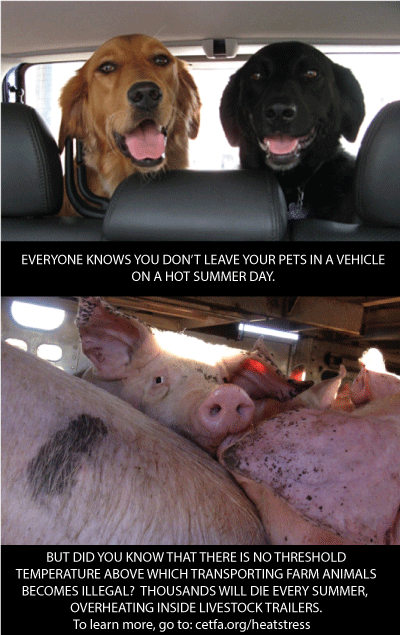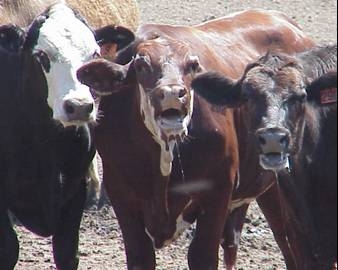With extreme hot weather striking many parts of Canada, humane societies and SPCAs are justifiably reminding us of the need to keep companion animals cool, and to not leave dogs unattended in cars. Companion animals, however, are not the only ones at risk.
All farm animals can suffer from heat stress, although pigs; high producing, lactating dairy cows; heavy “meat” chickens and turkeys; and young animals, are particularly susceptible. Signs of heat stress in farm animals might include panting, increased salivation, drooling or foaming, increased respiration rate or labored breathing, lethargy, and in some cases, unconsciousness or death.
To minimize risks of heat stress, farm animals should only be transported during the cooler hours of the day. Space per animal inside transport trucks should be increased by reducing stocking densities to ensure proper air flow between animals and, in the case of pigs, to allow them to lie down. Trucks should be tarped and well ventilated. Water should be provided regularly on long journeys.
Canadian transport regulations, the Health of Animals Act, Part XII, Sections 143, (1)(d) and (e) state that “No person shall transport or cause to be transported any animal in a railway car, motor vehicle, aircraft, vessel, crate or container if injury or undue suffering is likely to be caused to the animal by reason of undue exposure to the weather or inadequate ventilation.” Yet, in Canada, farm animals are routinely transported during mid-day intense heat in overcrowded, un-tarped trailers, with no forced ventilation or water, as documented by CETFA inspectors.
Even when outside temperatures are not extreme, temperatures inside a trailer can rise dramatically if it is slowed by construction, stuck in traffic or otherwise forced to sit stationary, such as during unloading or at border crossings, where no dedicated lanes exist for livestock trailers (see case documented by CETFA here). Moreover, the amount of water vapor in the air (humidity) can lower the air temperature that farm animals can withstand without becoming heat stressed. For instance, research indicates that temperatures over only 23oC (73oF) can cause stress to cattle when combined with high humidity. Various combinations of heat and humidity, along with transport conditions, thus have the potential to negatively impact farm animals and induce heat stress during the summer months.
If you see farm animals transported in inappropriate conditions and suffering from heat stress, please contact the Canadian Food Inspection Agency (CFIA), the government body responsible for the enforcement of farm animal transport regulations, to report your concerns. Provide details of your observations (location, time of the day, name of the transport company, and D.O.T number printed on the rig, as well as the species transported and the signs of heat stress you observe).
Remind the CFIA that livestock haulers are legally required to take reasonable steps to protect farm animals from severe weather and prevent unnecessary suffering, and urge them to enforce the regulations as they are mandated to do. Also, contact the trucking company involved and email us details of the incident.
Many dogs in heat stress situations have been helped trough public involvement. As more and more people are becoming concerned about farm animals, public involvement will also be instrumental in improving the welfare of farm animals during extreme weather conditions.
Contact information
Canadian Food Inspection Agency:
You can contact the CFIA at 1-800-442-2342 or through your local CFIA office (found in the blue pages of your telephone directory).




